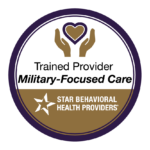Cognitive Behavioral Therapy (CBT)
Do you ever assume anything? Perhaps you think the worst, only to find out it was all very innocent?
CBT helps you overcome negative thoughts by increasing awareness and objectivity.
Literally everyone can benefit from learning CBT life-skills!
What is Cognitive Behavioral Therapy?
Cognitive Behavioral Therapy (CBT) helps people identify and change thinking and behavior patterns that are harmful or ineffective, replacing them with more accurate thoughts and functional behaviors, it can help a person focus on current problems and how to solve them. It often involves practicing new skills in the “real world.” ~American Psychiatric Association
Cognitive Behavioral Therapy represents a psychotherapeutic treatment method that helps clients to identify and change the disturbing and destructive thoughts they’re experiencing. Negative thoughts create negative behavior and emotions and thereby affect your mental health.

CBT Treatment Methods
CBT focuses on identifying thought distortions. Thought distortions are negative thought patterns including automatic thoughts, these thoughts bias our thinking and more often than not, lead us to an unhelpful or negative outlook. Below are a few CBT techniques used in overcoming cognitive distortions.
- Journaling
- Distortion identification
- Scripting (playing out the best, likely and worst-case scenarios)
Other CBT strategies can include role-playing, mindfulness, automatic thought identification, exposure and A.B.C. analysis (Antecedent, Behavior and Consequence).
In this innovative counseling process, the therapist takes on the role of collaborator and sound board. CBT is problem-oriented so clients will work with their therapist to establish goals. With CBT’s focus on the here and now, it helps clients take meaningful action and self-evaluate. The self-evaluation techniques in CBT helps clients and their therapist explore what is working and what isn’t bringing the changes sought from therapy.
CBT uses homework to reinforce skills taught and practiced in session. Do you remember a grown-up in your life saying “Practice, practice, practice” well CBT is designed to be time limited (12-20 weeks) therefore practicing skills in everyday life is needed to meet the goals identified when a client initiates therapy. CBT homework is likely to focus on one or all these tools:
- Thought records
- Scaling of distress
- Scheduling pleasant activities
- Building motivation through behavioral experiments
What Does Cognitive Behavioral Therapy Help With? SO MUCH!!
CBT helps you engage in healthier thinking patterns and it builds new and healthier coping skills to address the daily stressors we all face. When we feel more in control of our internal process, engaging in goal-directed behaviors is much easier.
CBT’s only requirement for success is a willingness to change and determination to work through the process. This process can be slow at times but the willingness to communicate with your therapist will help you build confidence and continue with the therapeutic process.
CBT has been extensively researched over the last 40 years and is an evidenced-based therapy for the treatment of anger issues, anxiety, depression, sleep, chronic pain, and PTSD.
If you want to turn the next page in your life and build coping skills to address stress, low self-esteem, impatience and much more, a compassionate, licensed therapist at MUV Counseling is here for you.
Our innovative counseling approach has helped many people overcome their fear, stress, grief anger, resentment and self confidence concerns.
We would love to help make life better for you too!
For more details about our CBT therapy options, call us at 480-300-2635 for a free 15 minute consultation or email us with your questions. If you’re ready to get started, schedule online here.




